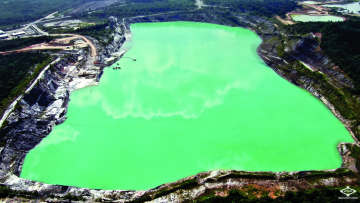Adaro is destroying Indonesian biodiversity “in coal blood”: Banks urged to stop funding

- Indonesia’s second-largest coal company, which claimed to use its profit boom to lead Indonesia’s green shift, might be mining for coal outside of the government-sanctioned permit area, a new report shows
- Adaro caused deforestation of 8,131.47 hectares, resulting in biodiversity loss and irreparable damage to the ecosystem
- Over 58,000 people have called on US and European banks to break ties with Adaro and stop funding its coal expansion
- Public mobilization is growing with activists in Asia, North America and Europe protesting against banks funding Adaro
A new report launched by corporate watchdog Ekō finds that Adaro is blatantly disregarding environmental regulations and flouting government-mandated permit areas to mine coal and amass dirty profits.
Adaro Energy is one of Indonesia’s biggest coal companies, operating huge mines and plants across Indonesia, and exporting millions of tons of coal all over the world. Adaro positions itself as a company with a strong reputation, branding its coal product as ‘envirocoal’, which it claims is less harmful than other types of coal. The company also presents itself as a responsible Indonesian company, highlighting its commitment to channeling profits from coal towards a green energy transition.
However, the report paints a stark contrast to the company’s claims of environmental stewardship. Pieced together through satellite analysis, the research finds that of Adaro Energy Indonesia’s total coal mining concession area of 23,942 hectares in South Kalimantan, 3,194.43 hectares were outside Adaro’s concession permits, and an additional 2,084.47 hectares were not just outside the permit but also within Permanent Production Forest Areas where no mining activity is allowed.
Other key findings include:
- One of Adaro’s coal wastewater storage ponds is situated around a mere 150 meters from the Mangkayahu village. This is a clear violation of environmental regulations that mandate a minimum distance between the edge of a mine hole and residential areas to be 500 meters.
- Adaro’s mining activities have spurred land conflicts among residents at the Tabalong Regency, in Bilas Village, Upau District since early 2005 and Wonorejo Village in Juai District, Balangan Regency, South Kalimantan since 2006.
- Government representatives from South Kalimantan highlighted that mining activities conducted in forest areas must have a Forest Utilization Business Permit and follow the Amdal or Environmental Impact Assessment (EIA) document as part of its mining operations approval. Adaro must establish that it is not illegally mining for coal in South Kalimantan and has fulfilled its EIA obligations. If found in violation of regulations, Adaro could face sanctions such as large fines, suspension of operations, and even revocation of mining permits.
Adaro’s list of environmental damage to Indonesia’s pristine rainforests is significant. Adaro’s nearest coal wastewater storage pond was found to be only around 150 meters from the Mangkayahu Village, even though regulations state that the minimum distance between the edge of a mine hole and residential areas should be 500 meters.
Additionally, Adaro's operations have triggered a variety of land conflicts since 2006, with communities in Tabalong Regency's Bilas Village, Upau District, and Wonorejo Village in Juai District, Balangan Regency, receiving inadequate compensation. Although the local government considers these issues resolved, community members disagree. Their fight for adequate compensation and the right to their land continues. As a direct result of Adaro’s actions, the once-thriving Wonorejo is now a ghost village with coal settling ponds in place of schools and community centers.
Adaro’s coal expansion plans are incompatible with global climate goals. Its decarbonisation journey is neither credible nor Paris-aligned but Western banks are continuing to fund Adaro’s coal expansion. Adaro has a US$750 million bond that will mature in October 2024 and some of Adaro’s previous underwriters such as Citibank, Deutsche Bank and UBS have not committed to not support Adaro’s upcoming bond. Thus, banks are fueling a coal expansion in complete contradiction with global climate goals. Over 58,000 people have signed a petition demanding that banks drop the Indonesian coal giant Adaro and activists across Asia, North America and Europe are planning action against banks funding Adaro.
“Banks in the US and Europe are risking grave reputational risks by associating themselves with a company that is flouting regulations, triggering displacement and causing whole-scale environmental damage,” Apekshita Varshney, Campaigner at Ekō said.
“Banks and investors must look beyond what Adaro is saying and conduct further due diligence into not only accusations of illegal coal mining but also controversies across its social and governance pillars. Investors would be wise to consider the growing body of detailed evidence of what Adaro is doing as presented by Indonesian frontline activists and communities at great personal risk. Until Adaro abandons its plans for coal and coal fired power expansion and commits to a credible green transition, investors and banks would be wise to immediately deny any new debt or equity to Adaro and take their fiduciary responsibility seriously,” she added.
“The Indonesian government must immediately conduct an audit of Adaro Indonesia and stop its production and sales until the company resolves problems around reclamation, agrarian conflicts, the environment and operations outside the Special Mining Business Permit (IUPK). We urge all parties to stop providing financial support and buying coal from Adaro Indonesia,” said Kisworo Dwi Cahyono, Executive Director of Walhi South Kalimantan.
“Adaro's operations outside their concession in South Kalimantan potentially threaten not only our forests but also undermine Indonesia's commitment to an energy transition. How can we move toward a sustainable future if we continue to rely on coal while sacrificing our natural resources?” Bondan Andriyanu, Climate and Energy Campaigner, Greenpeace Indonesia, said.

